354 start with P start with P
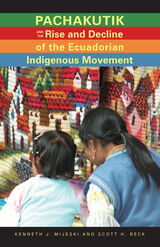
The mobilization of militant indigenous politics is one of the most important stories in Latin American studies today. In this critical work, Kenneth J. Mijeski and Scott H. Beck examine the rise and decline of Ecuador’s leading indigenous party, Pachakutik, as it tried to transform the state into a participative democracy.
Using in-depth interviews with political activists, as well as a powerful statistical analysis of election results, the authors show that the political election game failed to advance the causes of Ecuador’s poor or the movement’s own indigenous supporters. Pachakutik and the Rise and Decline of the Ecuadorian Indigenous Movement is an extraordinarily valuable case study of Ecuador’s indigenous movement and the challenges it still faces.
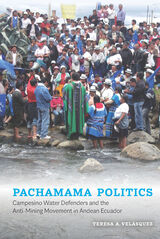
Pachamama Politics provides a rich ethnographic account of the tensions that follow from neoextractivism in the southern Ecuadorian Andes, where campesinos mobilized to defend their community-managed watershed from a proposed gold mine. Positioned as an activist-scholar, Teresa A. Velásquez takes the reader inside the movement—alongside marches, road blockades, and river and high-altitude wetlands—to expose the rifts between social movements and the “pink tide” government. When the promise of social change turns to state criminalization of water defenders, Velásquez argues that the contradictions of neoextractivism created the political conditions for campesinos to reconsider their relationship to indigeneity.
The book takes an intersectional approach to the study of anti-mining struggles and explains how campesino communities and their allies identified with and redeployed Indigenous cosmologies to defend their water as a life-sustaining entity. Pachamama Politics shows why progressive change requires a shift away from the extractive model of national development to a plurinational defense of community water systems and Indigenous peoples and their autonomy.


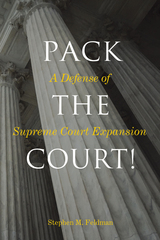
The United States Supreme Court has numbered nine justices for the past 150 years. But that number is not fixed. With the Democrats controlling the House and Senate during the Biden presidency, they could add justices to the Supreme Court. But would court packing destroy the Court as an apolitical judicial institution? This is the crucial question Stephen Feldman addresses in his provocative book, Pack the Court! He uses a historical, analytical, and political argument to justify court-packing in general and Democratic court-packing more specifically.
Republicans and Democrats alike profess to worry that court-packing will destroy the legitimacy of the Supreme Court as a judicial institution by injecting politics into a purely legal adjudicative process. But as Feldman’s insightful book shows, law and politics are forever connected in judicial interpretation and decision making. Pack the Court! insists that court packing is not the threat to the Supreme Court’s institutional legitimacy that many fear. Given this, Feldman argues that Democrats should pack the Court while they have the opportunity. Doing so might even strengthen the American people’s faith in the Court.
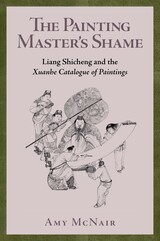
Overturning the long-held assumption that the Xuanhe Catalogue of Paintings was the work of the Northern Song emperor Huizong (r. 1100–1126), Amy McNair argues that it was compiled instead under the direction of Liang Shicheng. Liang, a high-ranking eunuch official who sought to raise his social status from that of despised menial to educated elite, had privileged access to the emperor and palace. McNair’s study, based on her translation and extensive analysis of the text of the Xuanhe Catalogue of Paintings, offers a definitive argument for the authorship of this major landmark in Chinese painting criticism and clarifies why and how it was compiled.
The Painting Master’s Shame describes the remarkable circumstances of the period around 1120, when the catalogue was written. The political struggles over the New Policies, the promotion of the “scholar amateur” ideal in painting criticism and practice, and the rise of eunuch court officials as a powerful class converged to allow those officials the unprecedented opportunity to enhance their prestige through scholarly activities and politics. McNair analyzes the catalogue’s central polemical narrative—the humiliation of the high-ranking minister mistakenly called by the lowly title “Painting Master”—as the key to understanding Liang Shicheng’s methods and motives.
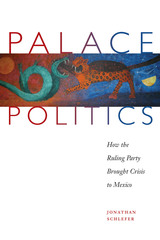
Bringing rare interviews and meticulous research to the cloaked world of Mexican politics in the mid-twentieth century, Palace Politics provides a captivating look at the authoritarian Mexican state—one of the longest-lived regimes of its kind in recent history—as well as the origins of political instability itself, with revelations that can be applied to a variety of contemporary political situations around the globe.
Culling a trove of remarkable firsthand accounts from former Mexican presidents, finance ministers, interior ministers, and other high officials from the 1950s through the 1980s, Jonathan Schlefer describes a world in which elite politics planted the seeds of a mammoth socioeconomic crisis. Palace Politics outlines the process by which political infighting among small rival factions of high officials drove Mexico to precarious situations at all levels of government. Schlefer also demonstrates how, earlier on, elite cooperation among these factions had helped sustain one of the most stable growth economies in Latin America, until all-or-nothing struggles began to tear the Mexican ruling party apart in the 1970s.
A vivid, seamlessly narrated history, Palace Politics is essential reading for anyone seeking to better understand not only the nation next door but also the workings of elite politics in general.
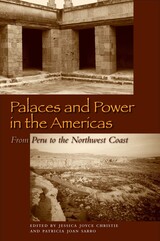
Ancient American palaces still captivate those who stand before them. Even in their fallen and ruined condition, the palaces project such power that, according to the editors of this new collection, it must have been deliberately drawn into their formal designs, spatial layouts, and choice of locations. Such messages separated palaces from other elite architecture and reinforced the power and privilege of those residing in them. Indeed, as Christie and Sarro write, "the relation between political power and architecture is a pervasive and intriguing theme in the Americas."
Given the variety of cultures, time periods, and geographical locations examined within, the editors of this book have grouped the articles into four sections. The first looks at palaces in cultures where they have not previously been identified, including the Huaca of Moche Site, the Wari of Peru, and Chaco Canyon in the U.S. Southwest. The second section discusses palaces as "stage sets" that express power, such as those found among the Maya, among the Coast Salish of the Pacific Northwest, and at El Tajín on the Mexican Gulf Coast. The third part of the volume presents cases in which differences in elite residences imply differences in social status, with examples from Pasado de la Amada, the Valley of Oaxaca, Teotihuacan, and the Aztecs. The final section compares architectural strategies between cultures; the models here are Farfán, Peru, under both the Chimú and the Inka, and the separate states of the Maya and the Inka.
Such scope, and the quality of the scholarship, make Palaces and Power in the Americas a must-have work on the subject.
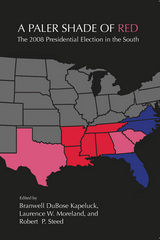
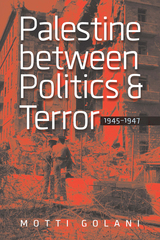
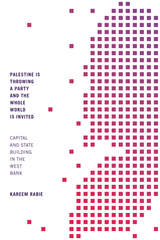

The future of the West Bank and Gaza remains the single most crucial issue in the search for peace in the Middle East. Examining the entire range of possible outcomes, Mark Heller argues that an independent Palestinian state in those territories, even one dominated by the PLO, could, under certain stringent conditions, be the preferred option for Israel.
In the first comprehensive treatment of the political, social, economic, and military factors bearing on the disposition of the West Bank and Gaza, Heller sets forth the possible alternatives—annexation by Israel, perpetuation of the status quo, federal or communal arrangements, and territorial compromise within the framework of the Jordanian option—and evaluates their implications for Israeli security.
Heller outlines the conditions under which he believes the establishment of a Palestinian state could be the optimal solution. He also discusses the economic prospects of a Palestinian state and the future of Jerusalem. His analysis is the boldest attempt yet to come to grips with the Palestinian question and the future of Israel. No one interested in the pursuit of a peaceful settlement of the Israeli–Arab conflict can afford to ignore this book.

Palestinians in Israel considers a key issue ignored by the official 'peace process' and most mainstream commentators: that of the growing Palestinian minority within Israel itself.
What the Israeli right-wing calls 'the demographic problem' Ben White identifies as 'the democratic problem' which goes to the heart of the conflict. Israel defines itself not as a state of its citizens, but as a Jewish state, despite the substantial and increasing Palestinian population. White demonstrates how the consistent emphasis on privileging one ethno-religious group over another cannot be seen as compatible with democratic values and that, unless addressed, will undermine any attempts to find a lasting peace.
Individual case studies are used to complement this deeply informed study into the great, unspoken contradiction of Israeli democracy. It is a pioneering contribution which will spark debate amongst all those concerned with a resolution to the Israel/Palestine conflict.
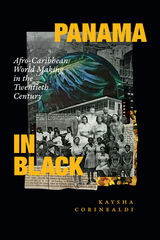

Focusing on the causes that generated nineteenth-century predatory militarism, including political illegitimacy and US support, Guevara Mann analyzes the so-called professionalization of the armed forces — institutionalized militarism — and the polices developed by the 1968-89 military regime.
The author cautions that although Panamanian Defense Forces were abolished after the US invasion of December 1989, and although the state’s security apparatus has been placed under civilian direction, Panama’s stability remains threatened. Lack of legitimacy — the characteristic which informs military involvement in politics — still persists, and militarism could well reappear if the Panamanian polity fails to achieve legitimacy.
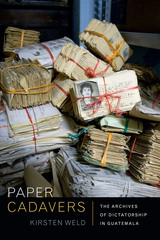
The unearthing of the archives renewed fierce debates about history, memory, and justice. In Paper Cadavers, Weld explores Guatemala's struggles to manage this avalanche of evidence of past war crimes, providing a firsthand look at how postwar justice activists worked to reconfigure terror archives into implements of social change. Tracing the history of the police files as they were transformed from weapons of counterinsurgency into tools for post-conflict reckoning, Weld sheds light on the country's fraught transition from war to an uneasy peace, reflecting on how societies forget and remember political violence.
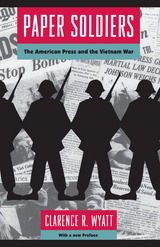
"Wyatt makes the Diem period in Saigon come to life—the primitive communications, the police crackdowns, the quarrels within the news organizations between the pessimists in Saigon and the optimists in Washington and New York."—Peter Braestrup, Washington Times
"An important, readable study of the Vietnam press corps—the most maligned group of journalists in modern American history. Clarence Wyatt's insights and assessments are particularly valuable now that the media is rapidly growing in its influence on domestic and international affairs."—Peter Arnett, CNN foreign correspondent
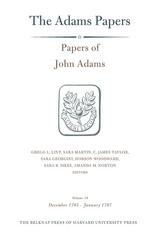
Volume 18 is the final volume of the Papers of John Adams wholly devoted to Adams’ diplomatic career. It chronicles fourteen months of his tenure as minister to Great Britain and his joint commission, with Thomas Jefferson, to negotiate treaties with Europe and North Africa. With respect to Britain, Adams found it impossible to do “any Thing Satisfactory, with this Nation,” and the volume ends with his decision to resign his posts. His diplomatic efforts, Adams thought, were too much akin to “making brick without straw.”
John Adams’ ministerial efforts in London were disappointing, but other aspects of his life were not. He and Jefferson failed to finalize treaties with Portugal and Great Britain, but they did, through agent Thomas Barclay, conclude a treaty with Morocco. Barclay’s letters are the earliest and most evocative American accounts of that region. Adams witnessed the marriage of his daughter, Abigail 2d, to William Stephens Smith, promoted the ordination of American Episcopal bishops, and toured the English countryside, first with Thomas Jefferson and then with his family. Most significant perhaps was the publication of the first volume of Adams’ Defence of the Constitutions of Government of the United States of America. This work is often attributed to concern over Shays’ Rebellion, of which Adams knew little when he began drafting. In fact, it was Adams’ summer 1786 visit to the Netherlands that provoked his work. There, Dutch Patriot friends, involved in their own revolution, expressed interest in seeing “upon paper” his remarks “respecting Government.”
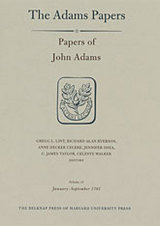
In mid-March 1781, John Adams received his commission and instructions as minister to the Netherlands and embarked on the boldest initiative of his diplomatic career. Disappointed by the lack of interest shown by Dutch investors in his efforts to raise a loan for the United States, Adams changed his tactics, and in a memorial made a forthright appeal to the States General of the Netherlands for immediate recognition of the United States. Published in Dutch, English, and French, it offered all of Europe a radical vision of the ordinary citizen’s role in determining political events. In this volume, for the first time, the circumstances and reasoning behind Adams’s bold moves in the spring of 1781 are presented in full.
In July the French court summoned Adams, the only American in Europe empowered to negotiate an Anglo–American peace, to Paris for consultations regarding an offer made by Austria and Russia to mediate the Anglo–French war. In his correspondence with France’s foreign minister, the Comte de Vergennes, Adams passionately insisted that the United States was fully and unambiguously independent and sovereign and must be recognized as such by Great Britain before any negotiations took place. This volume shows John Adams to be a determined and resourceful diplomat, unafraid to go beyond the bounds of traditional diplomacy to implement his vision of American foreign policy.
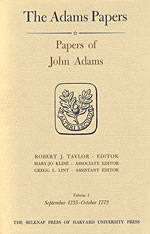
No family in three generations has contributed so much to American history as the Adamses. John Adams, John Quincy Adams, and Charles Francis Adams, despite periods of doubt, knew that history, if not their contemporaries, would recognize their accomplishments. When the Adams Papers series is complete, the writings of these three statesmen will have been examined thoroughly.
Aside from the Legal Papers of John Adams, published in 1965, these two volumes are the first in Series III: General Correspondence and Other Papers of the Adams Statesmen. Volumes 1 and 2 of the Papers of John Adams include letters to and from friends and colleagues, reports of committees on which he served, his polemical writings, published and unpublished, and state papers to which he made a contribution.
All of Adams’s newspaper writings, including “A Dissertation on the Canon and the Feudal Law,” are in these two volumes. In addition to being a condemnation of the Stamp Act, the “Dissertation” is shown to be one of the building blocks of the theory of a commonwealth of independent states under the king, which reaches complete statement in the Novanglus letters. For the first time, all thirteen of these letters appear in full with annotation.
The period September 1755 to April 1775 covers Adams’s public service in Braintree and Boston town meetings, the Massachusetts House of Representatives, the First Continental Congress, and the First Provincial Congress of Massachusetts. During this time his political future was being shaped by circumstances not always of his choosing. He hesitated at first at the threshold of a public career, political ambition in conflict with concern for his family’s well-being. But as the confrontation with Great Britain sharpened, the crisis became acute; no choice remained. For Adams there was no shirking the path of duty.
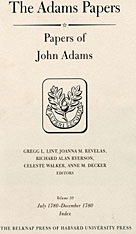
On the last day of December 1780, John Adams wrote that he had just spent “the most anxious and mortifying Year of my whole Life.” He had resided first at Paris, then at Amsterdam, attempting, without success, to open Anglo–American peace negotiations and to raise a Dutch loan. In volumes 9 and 10 of the Papers of John Adams, over 600 letters and documents that Adams sent to and received from numerous correspondents in Europe and America provide an unparalleled view of Adams’s diplomacy and a wealth of detail on the world in which he lived.
These volumes chronicle Adams’s efforts to convince the British people and their leaders that Britain’s economic survival demanded an immediate peace; his “snarling growling” debate with the French foreign minister, the Comte de Vergennes, over the proper Franco–American relationship; and his struggle to obtain a loan in the Netherlands, where policies were dictated by Mammon rather than republican virtue. Adams’s writings, diplomatic dispatches, and personal correspondence all make clear the scope of his intelligence gathering and his propaganda efforts in the British, French, and Dutch press. The letters reflect his interest in Bordeaux wines, the fate of Massachusetts Constitution that he had drafted in 1779, and political developments in Philadelphia, Boston, London, and St. Petersburg. The volumes leave no doubt as to John Adams’s unwavering commitment to the American cause. Even in this most difficult year, he believed the revolution in America to be “the greatest that ever took Place among Men.” He felt honored to serve a new nation where “the Wisdom and not the Man is attended to,” whose citizens were fighting a “People’s War” from which the United States would inevitably emerge victorious to take its rightful place on the world stage.
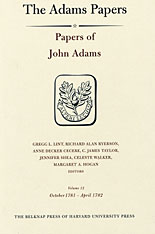
The American victory at Yorktown in October 1781 and the fall of Lord North’s ministry in March 1782 opened the possibility that John Adams might soon be involved in negotiations to end the war for American independence. To prepare for the occasion, Adams and Benjamin Franklin discussed in their letters the fundamentals for peace. Adams made it clear to the British government that there would be no negotiations without British recognition of the United States as independent and sovereign.
This volume chronicles Adams’s efforts, against great odds, to achieve formal recognition of the new United States. The documents include his vigorous response to criticism of his seemingly unorthodox methods by those who would have preferred that he pursue a different course, including Congress’s newly appointed secretary for foreign affairs, Robert R. Livingston.
In April 1782 the Netherlands recognized the United States and admitted John Adams as its minister. For Adams it was “the most Signal Epocha, in the History of a Century,” and he would forever see it as the foremost achievement of his diplomatic career. The volume ends with Adams, at long last a full-fledged member of the diplomatic corps, describing his reception by the States General and his audiences with the Prince and Princess of Orange.
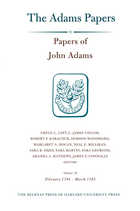
“Once more after an Interruption of ten Years, I pronounce myself a happy Man, and pray Heaven to continue me so.” Thus wrote John Adams in late August 1784 after the arrival in Europe of his wife Abigail and daughter Nabby. Adams and his family were living together in the pleasant Paris suburb of Auteuil. There Adams, with Benjamin Franklin and Thomas Jefferson, formed a joint commission to conclude commercial treaties with the nations of Europe and North Africa. For the first time since he had left America in 1778 on his first diplomatic mission, Adams was no longer engaged in “militia diplomacy.”
Volume 16 of the Papers of John Adams chronicles fourteen months of Adams’ diplomatic career. As minister to the Netherlands he raised a new Dutch loan to save America from financial ruin. As joint commissioner he negotiated a commercial treaty with Prussia, proposed similar treaties with other European nations, and prepared to negotiate with the Barbary states. The commissioners also sought to resolve Anglo-American differences left over from the peace negotiations and arising from the two nations’ burgeoning trade. Volume 16 thus forms a prelude to the next phase of John Adams’ diplomatic career, for his February 1785 appointment as minister to the Court of St. James meant that the management of Anglo-American relations would be his responsibility alone.



“Huzza for the new World and farewell to the Old One,” John Adams wrote in late 1787, wrapping up a decade’s worth of diplomatic service in Europe. Volume 19 of the Papers of John Adams chronicles Adams’s last duties in London and The Hague. In the twenty-eight months documented here, he petitioned the British ministry to halt impressment of American sailors, toured the English countryside, and observed parliamentary politics. Adams salvaged U.S. credit by contracting two new Dutch loans amid the political chaos triggered by William V’s resurgence. Correspondents like Thomas Jefferson and the Marquis de Lafayette mulled over the Anglo–American trade war that followed the Revolution and reported on the French Assembly of Notables—topics that Adams commented on with trademark candor. He wrote the final two volumes of his work, A Defence of the Constitutions of Government of the United States of America.
Adams yearned to return home and see the American republic take shape. “For a Man who has been thirty Years rolling like a stone,” Adams wrote, the choice was whether to “set down in private Life to his Plough; or push into turbulent scenes of Sedition and Tumult; whether be sent to Congress, or a Convention or God knows what.” Back on his native soil of Massachusetts in June 1788, Adams settled into rural retirement with wife Abigail and watched the U.S. Constitution’s ratification evolve. By volume’s end, John Adams again resumes public life, ready to serve as America’s first vice president.

"You may well Suppose that I was the Focus of all Eyes," John Adams wrote on 2 June 1785 of his first audience with George III, which formally inaugurated the post of American minister to Great Britain. Eager to restore "the old good Nature and the old good Humour" between the two nations, Adams spent the following months establishing the U.S. legation at No. 8 Grosvenor Square. For Adams, it was a period of multiple responsibilities and mixed success. He remained minister to the Netherlands and one of the joint commissioners charged with negotiating commercial treaties with the nations of Europe and North Africa--sensitive duties that occasionally called for Adams to encode his correspondence with the aid of his new secretary and future son-in-law, Col. William Stephens Smith.
Rebuffed by the British ministry in his mission to enforce the peace treaty of 1783 and renew Anglo-American commerce, Adams identified and achieved other goals. He preserved American credit despite the bankruptcy of a Dutch banking house that handled U.S. loans, petitioned for the release of impressed sailors, marked the ratification of the Prussian-American treaty, championed the needs of the American Episcopal Church, and laid the groundwork for negotiations with the Barbary States. His attention was not confined solely to foreign affairs. John Adams's letters from London, laced with his trademark candor, demonstrate his ripening Federalist view of the new American government's vulnerability and promise.

On September 3, 1783, John Adams, Benjamin Franklin, and John Jay signed the definitive Anglo-American peace treaty. Adams and his colleagues strived to establish a viable relationship between the new nation and its largest trading partner but were stymied by rising British anti-Americanism.
Adams’ diplomatic efforts were also complicated by domestic turmoil. Americans, in a rehearsal for the later Federalist-Antifederalist conflict over the United States Constitution, were debating the proper relationship between the central government and the states. Adams, a Federalist as early as 1783, argued persuasively for a government that honored its treaties and paid its foreign debts. But when bills far exceeding the funds available for their redemption were sent to Europe, he was forced to undertake a dangerous winter journey to the Netherlands to raise a new loan and save the United States from financial disaster.
None of the founding fathers equals the candor of John Adams’ observations of his eighteenth-century world. His letters, always interesting, reveal with absolute clarity Adams’ positions on the personalities and issues of his times.

John Adams reached Paris on October 26, 1782, for the final act of the American Revolution: the peace treaty. This volume chronicles his role in the negotiations and the decision to conclude a peace separate from France. Determined that the United States pursue an independent foreign policy, Adams's letters criticized Congress's naive confidence in France. But in April 1783, frustrated at delays over the final treaty and at real and imagined slights from Congress and Benjamin Franklin, Adams believed the crux of the problem was Franklin's moral bankruptcy and servile Francophilia in the service of a duplicitous Comte de Vergennes.
Volume 14 covers more than just the peace negotiations. As American minister to the Netherlands, Adams managed the distribution of funds from the Dutch-American loan. Always an astute observer, he commented on the fall of the Shelburne ministry and its replacement by the Fox-North coalition, the future of the Anglo-American relationship, and the prospects for the United States in the post-revolutionary world. But he was also an anxious father, craving news of John Quincy Adams's slow journey from St. Petersburg to The Hague. By May 1783, Adams was tired of Europe, but resigned to remaining until his work was done.

A new chapter in John Adams's diplomatic career opened when the Dutch recognized the United States in April 1782. Operating from the recently purchased American legation at The Hague, Adams focused his energies on raising a much needed loan from Dutch bankers and negotiating a Dutch-American commercial treaty. This volume chronicles Adams's efforts to achieve these objectives, but it also provides an unparalleled view of eighteenth-century American diplomacy on the eve of a peace settlement ending the eight-year war of the American Revolution.
John Adams was a shrewd observer of the political and diplomatic world in which he functioned and his comments on events and personalities remain the most candid and revealing of any American in Europe. His correspondence traces the complex negotiations necessary to raise a Dutch loan and throws new light on his conclusion of a treaty of amity and commerce with the Netherlands, achievements of which he was most proud. Events in England and elsewhere in Europe also provided grist for his pen. Would the establishment in July of a new ministry under the earl of Shelburne hinder or advance the cause of peace? That question bedeviled Adams and his correspondents for the fate of the new nation literally rode on its answer. The volume ends with Adams's triumphal departure from The Hague to face new challenges at Paris as one of the American commissioners to negotiate an Anglo-American peace treaty.

These volumes provide an unparalleled account of the conduct of American diplomacy in the early years of the republic, while the war with Britain continued and after the treaty of alliance with France was signed. John Adams served for ten months as a commissioner to France. Though he was the newest member of the three-man commission, he was its chief administrator, handling most of its correspondence, and his papers are the first full documentary record of the commission ever published. They provide a wealth of detail on every aspect of diplomacy, from negotiations with ministers of state to the arranging of prisoner exchanges.
The documents throw new light on Adams’s relations with his fellow commissioners, Benjamin Franklin and Arthur Lee. Historians have depicted Adams as hostile to Franklin and supportive of Lee, but the record shows that he found himself increasingly in disagreement with Lee, while working harmoniously with Franklin from the outset. Moreover, after the commission was disbanded in February 1779 and Franklin was appointed Minister to France—a move Adams had advocated—he undertook an important mission at Franklin’s behest. It is now clear that the rift that developed between the two statesmen did not begin until after Adams’s return to Paris in 1780.
Legal and constitutional scholars will find Volume 8 of particular interest. The Massachusetts Constitution of 1780, drafted by John Adams in 1779, served as a crucial source for the Constitution of the United States; today it is the oldest written constitution in the world still in effect. The earliest surviving version of Adams’s text, the Report of a Constitution for the Commonwealth of Massachusetts, is here published with full annotation for the first time. It is John Adams’s most enduring constitutional work.

These volumes document John Adams’s thinking and actions during the final years of his congressional service and take him through his first five months as a Commissioner in France in association with Benjamin Franklin and Arthur Lee.
While Adams was still in Philadelphia, military matters continued to he his major concern. Most demanding was his presidency of the Board of War, which took up his “whole Time, every Morning and Evening.” In general, though, the documents and reports of his conduct reveal a commitment to a national outlook. Congress should be a national legislature, and personal, state, and regional rivalries should give way to concern for the greater good—these were his deeply held convictions.
When chosen a Commissioner to France, Adams was reluctant to go. But duty and the honor of the position, along with the encouragement of an understanding and self-sacrificing wife, persuaded him to accept. With son John Quincy for a companion, he crossed the Atlantic to a new career. His initiation into the complexities of diplomacy brought a growing awareness of European affairs and the problems facing the new nation in the diplomatic arena. Letters deal with such varied topics as the supervision of American commercial agents in French ports, regulation of privateers, settlement of disputes between crews and officers, negotiation of loans, and help for American prisoners in England. Personal letters run the gamut from Adams’s views on the proper conduct of American diplomacy to strangers’ pleas for aid in locating relatives in America. Contrary to the usual impression of Adams as little more than a clerk for the Commission, evidence shows that he was its chief administrator.
Acclimation to living abroad among diplomats did not stifle Adams’s yearning for the simplicities of private life in the midst of his family. Yet as the important and interesting documents of this volume show, the groundwork was being laid for his even more significant role in diplomacy.

As the American colonies grew more restive, and a break with the mother country ceased to be unthinkable, John Adams was forced to spend less and less time with his beloved family. Although burdened by ever-expanding responsibilities in the Second Continental Congress, he found time for an amazing amount of correspondence. The majority of his letters were written to secure the facts that would enable this duty-ridden man to decide and act effectively on the issues being debated. Military affairs, a source of never-ending concern, provide some of the most fascinating subjects, including several accounts of the Battle of Bunker Hill, assessments of various high-ranking officers, and complaints about the behavior of the riflemen sent from three states southward to aid the Massachusetts troops.
The heated question of pay for soldiers and officers strained relations between New England and southern colonies early. By refusing to confront the issue of slavery when it was raised by several correspondents, Adams sought to avoid exacerbating regional sensitivities further. When the question of independent governments for former colonies arose, at the request of several colleagues Adams sketched a model, Thoughts on Government, three versions of which are included here.
His optimistic republicanism, however, was balanced by fear that a “Spirit of Commerce” would undermine the virtue requisite for republican institutions. Adams' important committee work included his draft in 1775 of rules for regulation of the Continental Navy, which have remained the basis for the governance of the United States Navy down into our own time, and his plan of treaties, which would guide American diplomats up to World War II. Both were derivative, but he skillfully adapted his materials to American needs and circumstances. These volumes reflect the spirit of those tumultuous years when the leaders emerging in America confronted each other, and exciting new ideas, as they tried to resolve the issues of a revolutionary period.

Hailed as “the most important congressman in the House of Representatives during the Civil War” and still honored in Pennsylvania as the father of its public school system, Thaddeus Stevens grappled in his day with many of the issues that confront us today: racial and economic equality, affirmative action, and equal access to education.
Volume one of the projected two-volume edition of The Papers of Thaddeus Stevens covers Steven’s political career from his Vermont youth to the end of the Civil War. It includes letters and speeches from his early days as a Gettysburg lawyer and as a representative in the Pennsylvania assembly through his antislavery efforts to the 1865 passage of the Thirteenth Amendment, freeing all slaves.


China’s bold program of reforms launched in the late 1970s—the move to a market economy and the opening to the outside world—ended the political chaos and economic stagnation of the Cultural Revolution and sparked China’s unprecedented economic boom. Yet, while the reforms made possible a rising standard of living for the majority of China’s population, they came at the cost of a weakening central government, increasing inequalities, and fragmenting society.
The essays of Barry Naughton, Joseph Fewsmith, Paul H. B. Godwin, Murray Scot Tanner, Lianjiang Li and Kevin J. O’Brien, Tianjian Shi, Martin King Whyte, Thomas P. Bernstein, Dorothy J. Solinger, David S. G. Goodman, Kristen Parris, Merle Goldman, Elizabeth J. Perry, and Richard Baum and Alexei Shevchenko analyze the contradictory impact of China’s economic reforms on its political system and social structure. They explore the changing patterns of the relationship between state and society that may have more profound significance for China than all the revolutionary movements that have convulsed it through most of the twentieth century.

A central current in the history of democratic politics is the tensions between the political culture of an informed citizenry and the potentially antidemocratic impulses of the larger mass of individuals who are only marginally involved in the political world. Given the public’s low level of political interest and knowledge, it is paradoxical that the democratic system works at all.
In The Paradox of Mass Politics W. Russell Neuman analyzes the major election surveys in the United States for the period 1948–1980 and develops for each a central index of political sophistication based on measures of political interest, knowledge, and style of political conceptualization. Taking a fresh look at the dramatic findings of public apathy and ignorance, he probes the process by which citizens acquire political knowledge and the impact of their knowledge on voting behavior.
The book challenges the commonly held view that politically oriented college-educated individuals have a sophisticated grasp of the fundamental political issues of the day and do not rely heavily on vague political symbolism and party identification in their electoral calculus. In their expression of political opinions and in the stability and coherence of those opinions over time, the more knowledgeable half of the population, Neuman concludes, is almost indistinguishable from the other half. This is, in effect, a second paradox closely related to the first.
In an attempt to resolve a major and persisting paradox of political theory, Neuman develops a model of three publics, which more accurately portrays the distribution of political knowledge and behavior in the mass population. He identifies a stratum of apoliticals, a large middle mass, and a politically sophisticated elite. The elite is so small (less than 5 percent) that the beliefs and behavior of its member are lost in the large random samples of national election surveys, but so active and articulate that its views are often equated with public opinion at large by the powers in Washington. The key to the paradox of mass politics is the activity of this tiny stratum of persons who follow political issues with care and expertise. This book is essential reading for concerned students of American politics, sociology, public opinion, and mass communication.


Guiding this transformation was the nineteenth-century Republican party. Drawing heavily from both the pro-market commitments of the early Whig party and the anti-capitalist culture of Jackson's Democratic party, the early Republican party found itself torn between these competing values. Nowhere was this contested process more obvious or more absorbing than in Civil War-era Michigan, the birthplace of the Republican party.
In The Paradox of Progress, a fascinating look at the central factors underlying the history of the GOP, Martin Hershock reveals how in their determination to resolve their ideological dilemma, Republicans of the Civil War era struggled to contrive a formula that wo uld enable them to win popular elections and to model America's acceptance of Gilded Age capitalism.
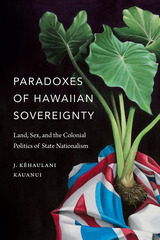


"The distinguishing thing about the paranoid style is not that its exponents see conspiracies or plots here and there in history, but that they regard a 'vast' or 'gigantic' conspiracy as the motive force in historical events...The paranoid spokesman sees the fate of this conspiracy in apocalyptic terms--he traffics in the birth and death of whole worlds, whole political orders, whole systems of human values. He is always manning the barricades of civilization."
--From the book
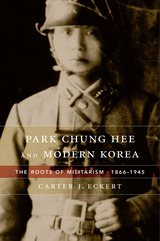
For South Koreans, the twenty years from the early 1960s to late 1970s were the best and worst of times—a period of unprecedented economic growth and of political oppression that deepened as prosperity spread. In this masterly account, Carter J. Eckert finds the roots of South Korea’s dramatic socioeconomic transformation in the country’s long history of militarization—a history personified in South Korea’s paramount leader, Park Chung Hee.
The first volume of a comprehensive two-part history, Park Chung Hee and Modern Korea: The Roots of Militarism, 1866–1945 reveals how the foundations of the dynamic but strongly authoritarian Korean state that emerged under Park were laid during the period of Japanese occupation. As a cadet in the Manchurian Military Academy, Park and his fellow officers absorbed the Imperial Japanese Army’s ethos of victory at all costs and absolute obedience to authority. Japanese military culture decisively shaped Korea’s postwar generation of military leaders. When Park seized power in an army coup in 1961, he brought this training and mentality to bear on the project of Korean modernization.
Korean society under Park exuded a distinctively martial character, Eckert shows. Its hallmarks included the belief that the army should intervene in politics in times of crisis; that a central authority should plan and monitor the country’s economic system; that the Korean people’s “can do” spirit would allow them to overcome any challenge; and that the state should maintain a strong disciplinary presence in society, reserving the right to use violence to maintain order.
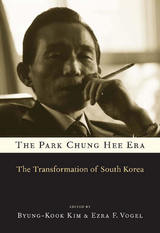
In 1961 South Korea was mired in poverty. By 1979 it had a powerful industrial economy and a vibrant civil society in the making, which would lead to a democratic breakthrough eight years later. The transformation took place during the years of Park Chung Hee's presidency. Park seized power in a coup in 1961 and ruled as a virtual dictator until his assassination in October 1979. He is credited with modernizing South Korea, but at a huge political and social cost.
South Korea's political landscape under Park defies easy categorization. The state was predatory yet technocratic, reform-minded yet quick to crack down on dissidents in the name of political order. The nation was balanced uneasily between opposition forces calling for democratic reforms and the Park government's obsession with economic growth. The chaebol (a powerful conglomerate of multinationals based in South Korea) received massive government support to pioneer new growth industries, even as a nationwide campaign of economic shock therapy-interest hikes, devaluation, and wage cuts-met strong public resistance and caused considerable hardship.
This landmark volume examines South Korea's era of development as a study in the complex politics of modernization. Drawing on an extraordinary range of sources in both English and Korean, these essays recover and contextualize many of the ambiguities in South Korea's trajectory from poverty to a sustainable high rate of economic growth.
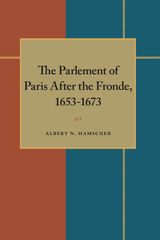
This book assesses how and to what extent the governments of Cardinal Mazarin and Louis XIV controlled the Parlement of Paris in the two decades after the civil wars known as the Fronde. The history of this prestigious court of law bears directly on the broader issue of the growth of “royal absolutism.” Few historians have examined the resurgence of royal authority after the Fronde from the vantage point of traditional institutions, and no other scholarly work deals extensively with the activities of Parlement during this controversial period. This study reveals the methods, achievements, and limitations of absolutism associated with the Sun King.
The book investigates the impact of royal policies on the way the judges acquired and transmitted their posts, the sources of their wealth, the social composition of their court, and their judicial and administrative authority. Parlement's political activities and its conflicts with the crown over issues of judicial, financial, and religious importance also receive thorough treatment.
The author's extensive archival research indicates that many widely held assumptions about declining importance of Parlement after the civil war are unwarranted. Although Parlement's political activities gradually declined, this transformation was neither as complete nor as irreversible as historians have asserted. Parlement retained some voice in affairs of state, and most of the administrative machinery it could employ to oppose royal policy remained intact. Moreover, the crown failed to attack the sources of parlementaire wealth, and the judges freely enhanced their court's status as a social corporation.

In 1624 James I invited Parliament to discuss issues of war and peace, setting a precedent which would make yet another inroad into the ancient prerogatives of the crown. The so-called “Happy Parliament” dismayed the peace-loving King by supporting Prince Charles and the Duke of Buckingham in their demands for war with Spain.
Robert Ruigh presents an absorbing and authoritative analytic narrative of the proceedings between Parliament and the crown and their far-reaching constitutional and political consequences. His use of fifteen parliamentary diaries and other contemporary manuscripts has resulted in a balanced account which avoids the tendency to vilify the Stuarts and glorify the Commons, and which provides an integrated and perceptive picture of the Parliament. He presents an analysis of patronage in relation to the composition of the Commons and a reevaluation of historical generalizations about the senility and ineffectuality of King James during his declining years, the seizure of power by the Duke and the Prince and their management of Parliament, the precedent of free speech in foreign affairs, and the effect of Parliament on contemporary politics.
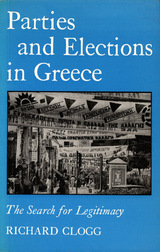

Offering a concise and compelling explanation of the causes of this resurgence, David W. Rohde argues that a realignment of electoral forces led to a reduction of sectional divisions within the parties—particularly between the northern and southern Democrats—and to increased divergence between the parties on many important issues. He challenges previous findings by asserting that congressional reform contributed to, rather than restrained, the increase of partisanship. Among the Democrats, reforms siphoned power away from conservative and autocratic committee chairs and put control of those committees in the hands of Democratic committee caucuses, strengthening party leaders and making both party and committee leaders responsible to rank-and-file Democrats. Electoral changes increased the homogeneity of House Democrats while institutional reforms reduced the influence of dissident members on a consensus in the majority party. Rohde's accessible analysis provides a detailed discussion of the goals of the congressional reformers, the increased consensus among Democrats and its reinforcement by their caucus, the Democratic leadership's use of expanded powers to shape the legislative agenda, and the responses of House Republicans. He also addresses the changes in the relationship between the House majority and the president during the Carter and Reagan administrations and analyzes the legislative consequences of the partisan resurgence.
A readable, systematic synthesis of the many complex factors that fueled the recent resurgence of partisanship, Parties and Leaders in the Postreform House is ideal for course use.
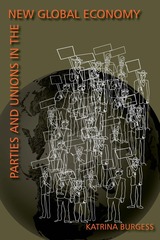
For much of the twentieth century, unions played a vital role in shaping political regimes and economic development strategies, particularly in Latin America and Europe. However, their influence has waned as political parties with close ties to unions have adopted neoliberal reforms harmful to the interests of workers.
What do unions do when confronted with this “loyalty dilemma”? Katrina Burgess compares events in three countries to determine the reasons for widely divergent responses on the part of labor leaders to remarkably similar challenges. She argues that the key to understanding why some labor leaders protest and some acquiesce lies essentially in two domains: the relative power of the party and the workers to punish them, and the party's capacity to act autonomously from its own government.
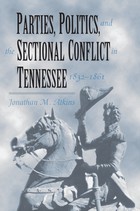
In this thought-provoking study, Jonathan M. Atkins provides a fresh look at the partisan ideological battles that marked the political culture of antebellum Tennessee. He argues that the legacy of party politics was a key factor in shaping Tennessee's hesitant course during the crisis of Union in 1860–61.
Between the Jacksonian era and the outbreak of the Civil War, Atkins demonstrates, the competition between Democrats and Whigs in Tennessee was as heated as any in the country. The conflict centered largely on differing conceptions of republican liberty and each party's contention that the other posed a serious threat to that liberty. As the slavery question pushed to the forefront of national politics, Tennessee's parties absorbed the issue into the partisan tumult that already existed. Both parties pledged to defend southern interests while preserving the integrity of the Union. Appeals for the defense of liberty and Union interests proved effective with voters and profoundly influenced the state's actions during the secession crisis. The belief that a new national Union party could preserve the Union while checking the Lincoln administration encouraged voters initially to reject secession. With the outbreak of war, however, West and Middle Tennesseans chose to accept disunion to avoid what they saw as coercion and military despotism by the North. East Tennesseans, meanwhile, preferred loyalty to the Union over membership in a Southern confederacy dominated by a slaveholding aristocracy.
No previous book has so clearly detailed the role of party politics and ideology in Tennessee's early history. As Atkins shows, the ideological debate helps to explain not only the character and survival of Tennessee's party system but also the peristent strength of unionism in a state that ultimately joined the Southern cause.
The Author: Jonathan M. Atkins is assistant professor of history at Berry College in Mt. Berry, Georgia.
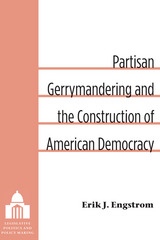
Erik J. Engstrom offers a historical perspective on the effects of gerrymandering on elections and party control of the U.S. national legislature. Aside from the requirements that districts be continuous and, after 1842, that each select only one representative, there were few restrictions on congressional districting. Unrestrained, state legislators drew and redrew districts to suit their own partisan agendas. With the rise of the “one-person, one-vote” doctrine and the implementation of the Voting Rights Act of 1965, however, redistricting became subject to court oversight.
Engstrom evaluates the abundant cross-sectional and temporal variation in redistricting plans and their electoral results from all the states, from 1789 through the 1960s, to identify the causes and consequences of partisan redistricting. His analysis reveals that districting practices across states and over time systematically affected the competitiveness of congressional elections; shaped the partisan composition of congressional delegations; and, on occasion, determined party control of the House of Representatives.
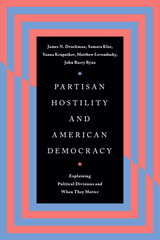
An unflinching examination of the effects and boundaries of partisan animosity.
For generations, experts argued that American politics needed cohesive parties to function effectively. Now many fear that strong partisan views, particularly hostility to the opposing party, are damaging democracy. Is partisanship as dangerous as we fear it is?
To provide an answer, this book offers a nuanced evaluation of when and how partisan animosity matters in today’s highly charged, dynamic political environment, drawing on panel data from some of the most tumultuous years in recent American history, 2019 through 2021. The authors show that partisanship powerfully shapes political behaviors, but its effects are conditional, not constant. Instead, it is most powerful when politicians send clear signals and when an issue is unlikely to bring direct personal consequences. In the absence of these conditions, other factors often dominate decision-making.
The authors argue that while partisan hostility has degraded US politics—for example, politicizing previously non-political issues and undermining compromise—it is not in itself an existential threat. As their research shows, the future of American democracy depends on how politicians, more than ordinary voters, behave.
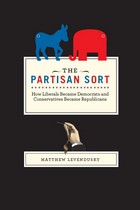
As Washington elites drifted toward ideological poles over the past few decades, did ordinary Americans follow their lead? In The Partisan Sort, Matthew Levendusky reveals that we have responded to this trend—but not, for the most part, by becoming more extreme ourselves. While polarization has filtered down to a small minority of voters, it also has had the more significant effect of reconfiguring the way we sort ourselves into political parties.
In a marked realignment since the 1970s—when partisan affiliation did not depend on ideology and both major parties had strong liberal and conservative factions—liberals today overwhelmingly identify with Democrats, as conservatives do with Republicans. This “sorting,” Levendusky contends, results directly from the increasingly polarized terms in which political leaders define their parties. Exploring its far-reaching implications for the American political landscape, he demonstrates that sorting makes voters more loyally partisan, allowing campaigns to focus more attention on mobilizing committed supporters. Ultimately, Levendusky concludes, this new link between party and ideology represents a sea change in American politics.
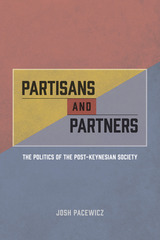
Wheels-down in Iowa—that most important of primary states—Pacewicz looks to two cities, one traditionally Democratic, the other traditionally Republican, and finds that younger voters are rejecting older-timers’ strict political affiliations. A paradox is emerging—as the dividing lines between America’s political parties have sharpened, Americans are at the same time growing distrustful of traditional party politics in favor of becoming apolitical or embracing outside-the-beltway candidates. Pacewicz sees this change coming not from politicians and voters, but from the fundamental reorganization of the community institutions in which political parties have traditionally been rooted. Weaving together major themes in American political history—including globalization, the decline of organized labor, loss of locally owned industries, uneven economic development, and the emergence of grassroots populist movements—Partisans and Partners is a timely and comprehensive analysis of American politics as it happens on the ground.

As long as far-right parties—known chiefly for their vehement opposition to immigration—have competed in contemporary Western Europe, many have worried about these parties’ acceptability to democratic voters and mainstream parties. Yet, rather than treating the far right as pariahs, major mainstream-right parties have included the far right in 15 governing coalitions from 1994 to 2017. Parties do not care equally about all issues at any given time, and Kimberly Twist demonstrates that far-right parties will agree to support the mainstream right’s goals more readily than many other parties, making them appealing partners.
Partnering with Extremists builds on existing work on coalition formation and party goals to propose a theory of coalition formation that works across countries and over time. The evidence comes from 19 case studies of coalition formation in Austria and the Netherlands, countries where far-right parties have been excluded when they could have been included and included when the mainstream right had other options. The argument is then extended to countries where coalitions are less common, France and the United Kingdom, and to cases of mainstream-right adoption of far-right themes. Twist incorporates both office and policy considerations in her argument and reimagines “policy” to be a two-dimensional factor; it matters not just where parties are located on an issue but how firmly they hold those positions.

Are American political parties on the way out? Political action committees (PACs) currently compete with parties for influence over candidates and voters; persuading a more independent and volatile electorate requires new tactics; technological innovations afford more sophisticated means to appeal for support. Many political observers express doubts about the ability of political parties to adapt to these changes and to survive, but Paul Herrnson instead suggests their survival and resurgence in this balanced assessment of party activities in congressional elections.
Drawing on extensive interviews and survey data collected from nearly five hundred recent House and Senate candidates, campaign advisers, party officials, PAC executives, and journalists, Herrnson evaluates the roles of the national parties. He finds that from the perspective of party executives, they provide important campaign services and function as the key brokers between candidates, PACs, and other campaigners. For PAC officials, the national parties serve as important sources of strategic campaign information and cues for decision-making. For the candidates themselves, their parties function as appendages and accessories to their own campaign organizations.
Herrnson provides rich detail on party development and party campaign activity to predict the future of congressional elections and of the party-in-government and the party-in-the-electorate. Political practitioners as well as scholars will welcome this fresh, new contribution to a significant political controversy.
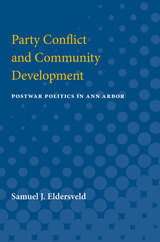
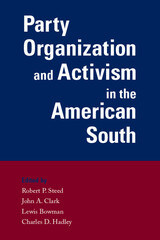
Maps the ways political parties remain vital components in the American political system, especially in the eleven states in the South
As Tocqueville noted more than 100 years ago, “No countries need associations more . . . than those with a democratic social state.” Although some contemporary observers see a decline in associations, especially in the political sphere, the contributors in this volume argue not only that political parties remain an essential component of the American political system but also that grassroots political groups have revitalized the political process, especially in the South.
Using data gathered from local party officials in the eleven southern states, the authors examine such key issues as: Who becomes involved in local party organizations and why? How do parties recruit and retain workers? What are the ideological and issue orientations of these activists? How does intraparty factionalism affect local party organizations? What is the connection between the party organization and its external environment?
The large regional database provides these contributors with the opportunity to extend the study of local party organization and activists, thus addressing some of the significant gaps in previous research. The additional data enable them to clarify the nature of local party organizations and, in a larger sense, the role of the parties in the contemporary American political system.
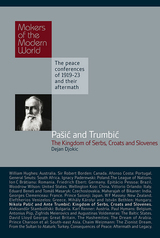
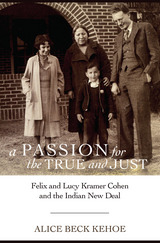
Kehoe argues that, due to anti-Semitism in 1930s America, Cohen could not speak for his legislation before Congress, and that Collier, an upper-class WASP, became the spokesman as well as the administrator. According to the author, historians of the Indian New Deal have not given due weight to Cohen’s work, nor have they recognized its foundation in his liberal secular Jewish culture. Both Felix and Lucy Cohen shared a belief in the moral duty of mitzvah, creating a commitment to the “true and the just” that was rooted in their Jewish intellectual and moral heritage, and their Social Democrat principles.
A Passion for the True and Just takes a fresh look at the Indian New Deal and the radical reversal of US Indian policies it caused, moving from ethnocide to retention of Indian homelands. Shifting attention to the Jewish tradition of moral obligation that served as a foundation for Felix and Lucy Kramer Cohen (and her professor Franz Boas), the book discusses Cohen’s landmark contributions to the principle of sovereignty that so significantly influenced American legal philosophy.
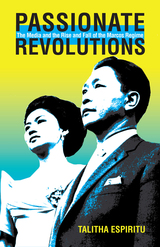
In the last three decades, the dictatorship of Ferdinand Marcos has commanded the close scrutiny of scholars. These studies have focused on the political repression, human rights abuses, debt-driven growth model, and crony capitalism that defined Marcos’ so-called Democratic Revolution in the Philippines. But the relationship between the media and the regime’s public culture remains underexplored.
In Passionate Revolutions, Talitha Espiritu evaluates the role of political emotions in the rise and fall of the Marcos government. Focusing on the sentimental narratives and melodramatic cultural politics of the press and the cinema from 1965 to 1986, she examines how aesthetics and messaging based on heightened feeling helped secure the dictator’s control while also galvanizing the popular struggles that culminated in “people power” and government overthrow in 1986.
In analyzing news articles, feature films, cultural policy documents, and propaganda films as national allegories imbued with revolutionary power, Espiritu expands the critical discussion of dictatorships in general and Marcos’s in particular by placing Filipino popular media and the regime’s public culture in dialogue. Espiritu’s interdisciplinary approach in this illuminating case study of how melodrama and sentimentality shape political action breaks new ground in media studies, affect studies, and Southeast Asian studies.
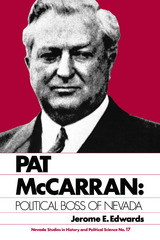
Within his native state of Nevada, McCarran constructed a machine designed to dominate the state’s political and economic life. This domination, which extended to both political parties, was built on personal favors for constituents, shrewd use of patronage, rewards for friends, and inevitable punishment for those suspected of being enemies. Ironically, the Senator employed the same tactics that others had once used against him to stymie his own early political efforts.
This work discusses the Senator’s background, his rise to power, and his methods of establishing political domination. Personal correspondence, excerpts from speeches, newspaper editorials, and interviews all help bring to life a colorful account of a controversial, driven man who held the levers of political control in Nevada during the early twentieth century.
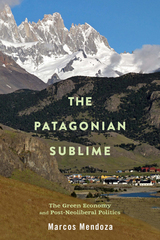
Mendoza explores the fraught intersection of the green economy with the New Left politics of the Néstor Kirchner and Cristina Fernández de Kirchner governments. Mendoza documents the strategies of capitalist development, national representation, and political rule embedded in the “green productivist” agenda pursued by Kirchner and Fernández. Mendoza shows how Andean Patagonian communities have responded to the challenges of community-based conservation, the fashioning of wilderness zones, and the drive to create place-based monopolies that allow ecotourism destinations to compete in the global consumer economy.
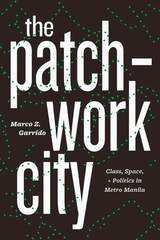
The Patchwork City illuminates how segregation, class relations, and democracy are all intensely connected. It makes clear, ultimately, that class as a social structure is as indispensable to the study of Manila—and of many other cities of the Global South—as race is to the study of American cities.
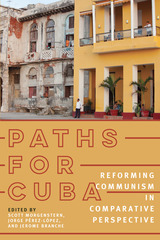
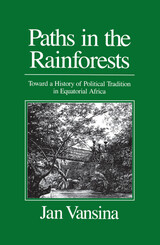
Vansina’s scope is breathtaking: he reconstructs the history of the forest lands that cover all or part of southern Cameroon, Gabon, Equatorial Guinea, the Congo, Zaire, the Central African Republic, and Cabinda in Angola, discussing the original settlement of the forest by the western Bantu; the periods of expansion and innovation in agriculture; the development of metallurgy; the rise and fall of political forms and of power; the coming of Atlantic trade and colonialism; and the conquest of the rainforests by colonial powers and the destruction of a way of life.
“In 400 elegantly brilliant pages Vansina lays out five millennia of history for nearly 200 distinguishable regions of the forest of equatorial Africa around a new, subtly paradoxical interpretation of ‘tradition.’” —Joseph Miller, University of Virginia
“Vansina gives extended coverage . . . to the broad features of culture and the major lines of historical development across the region between 3000 B.C. and A.D. 1000. It is truly an outstanding effort, readable, subtle, and integrative in its interpretations, and comprehensive in scope. . . . It is a seminal study . . . but it is also a substantive history that will long retain its usefulness.”—Christopher Ehret, American Historical Review
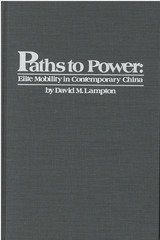
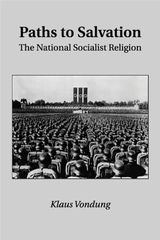
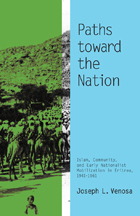
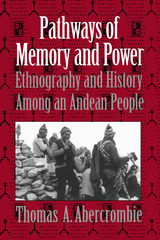
Making clear the early and deep intermingling of practices and world views among Spaniards and Andeans, Christians and non-Christians, Abercrombie critiques both the romanticist tendency to regard Andean culture as still separate from and resistant to European influences, and the melodramatic view that all indigenous practices have been obliterated by colonial and national elites. He challenges prejudices that, from colonial days to the present, have seen Andean historical knowledge only in mythic narratives or narratives of personal experience. Bringing an ethnographer’s approach to historiography, he shows how complex Andean rituals that hybridize European and indigenous traditions—such as libation dedications and llama sacrifices held on saints’ day festivals—are in fact potent evidence of social memory in the community.

While civics textbooks describe an idealized model of “how a bill becomes law;” journalists often emphasize special interest lobbying and generous campaign contributions to Congress; and other textbooks describe common stages through which all policies progress, these approaches fail to convey—much less explain—the tremendous diversity in political processes that shape specific policies in contemporary Washington.
Bridging the gap between textbook models of how public policy should work, and how the process actually works in contemporary Washington, Pathways of Power provides a framework that integrates the roles of political interests and policy ideals in the contemporary policy process. This book argues that the policy process can be understood as a set of four distinctive pathways of policymaking—pluralist, partisan, expert, and symbolic—that draw upon different political resources, appeal to different political actors, and elicit unique strategies and styles of coalition building.
Revealing the strategic behavior of policy actors who compete to shift policies onto pathways that maximize their resources and influence, the book provides a fresh approach to understanding the seeming chaos and volatility of the policy process today. The book’s use of a wide universe of major policy decisions and case studies, focused on such key areas as health care, federal budgeting, and tax policy, provides a useful foundation for students of the policy process as well as for policy practitioners eager to learn more about their craft.

Patrice Lumumba was a leader of the independence struggle in what is today the Democratic Republic of the Congo, as well as the country’s first democratically elected prime minister. After a meteoric rise in the colonial civil service and the African political elite, he became a major figure in the decolonization movement of the 1950s. Lumumba’s short tenure as prime minister (1960–1961) was marked by an uncompromising defense of Congolese national interests against pressure from international mining companies and the Western governments that orchestrated his eventual demise.
Cold war geopolitical maneuvering and well-coordinated efforts by Lumumba’s domestic adversaries culminated in his assassination at the age of thirty-five, with the support or at least the tacit complicity of the U.S. and Belgian governments, the CIA, and the UN Secretariat. Even decades after Lumumba’s death, his personal integrity and unyielding dedication to the ideals of self-determination, self-reliance, and pan-African solidarity assure him a prominent place among the heroes of the twentieth-century African independence movement and the worldwide African diaspora.
Georges Nzongola-Ntalaja’s short and concise book provides a contemporary analysis of Lumumba’s life and work, examining both his strengths and his weaknesses as a political leader. It also surveys the national, continental, and international contexts of Lumumba’s political ascent and his swift elimination by the interests threatened by his ideas and practical reforms.
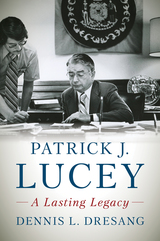
Preceding his service as governor, Lucey played a key role in rebuilding the Democratic Party in Wisconsin, returning a state that had been dominated by Republicans to a more moderate two-party system. As party chairman, he built coalitions between World War II veterans, remnants of the defunct Progressive Party, urban socialists, and activists in rural communities throughout the state.
Through exclusive interviews and unprecedented access to archival materials, Dennis L. Dresang shares the story of this pivotal figure in Wisconsin history, from his small-town rural roots to his wide-ranging influence.

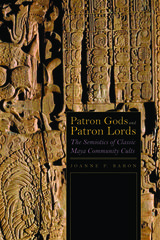
Using semiotic theory, Baron draws on three bodies of evidence: ethnographies and manuscripts from Postclassic, Colonial, and modern Maya communities that connect patron saints to pre-Columbian patron gods; hieroglyphic texts from the Classic period that discuss patron deity veneration; and excavations from four patron deity temples at the site of La Corona, Guatemala. She shows how the Classic Maya used patron deity effigies, temples, and acts of devotion to negotiate group membership, social entitlements, and obligations between individuals and communities. She also explores the wider role of these processes in politics, arguing that rituals and discourses related to patron deities ultimately formulated Maya rulership as a locally oriented institution, which limited the ability of powerful kingdoms to create wider religious communities.
Applying a new theoretical approach for the archaeological study of ideology and power dynamics, Patron Gods and Patron Lords reveals an overlooked aspect of the belief system of Maya communities.
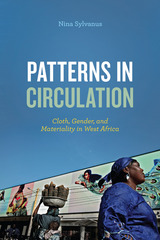
Sylvanus brings wax cloth’s unique and complex history to light: born as a nineteenth-century Dutch colonial effort to copy Javanese batik cloth for Southeast Asian markets, it was reborn as a status marker that has dominated the visual economy of West African markets. Although most wax cloth is produced in China today, it continues to be central to the expression of West African women’s identity and power. As Sylvanus shows, wax cloth expresses more than this global motion of goods, capital, aesthetics, and labor—it is a form of archive where intimate and national memories are stored, always ready to be reanimated by human touch. By uncovering this crucial aspect of West African material culture, she enriches our understanding of global trade, the mutual negotiations that drive it, and the how these create different forms of agency and subjectivity.
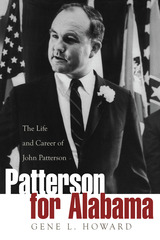
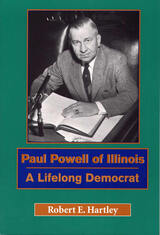
Paul Powell emerged from the hill country of southern Illinois to serve in state government from 1935 until his death in 1970. His political tenure included three terms as Speaker of the Illinois House, four terms as minority leader, and two terms as secretary of state. The sponsor of hundreds of bills, he worked tirelessly for his constituents in southern Illinois. He also worked tirelessly to promote his own interests.
In this first political biography of Powell, Robert E. Hartley follows the money. He tells how this man of humble origins and meager means amassed a world-class political and financial base. Part of that story is the disclosure of a personal fortune that boggled minds, including the unbelievable yarn of the $800,000 cash found in the hotel room following Powell's death.
Powell never earned a state salary of more than $30,000 per year, yet in the last year of his life, his federal income tax return showed an income of more than $200,000. At his death his estate totaled $3.2 million, and, when settled in 1978, was worth $4.6 million, including nearly $1 million in racetrack stock.
Following Powell's story, Hartley takes us deep into the Illinois political world of the 1940s, 1950s, and 1960s, a time when politicians were on an "honor system" regarding their financial holdings. This was before disclosure of political contributions, before computer records, and before public meetings laws.
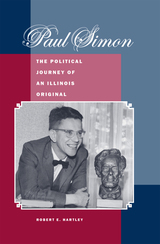
With Paul Simon: The Political Journey of an Illinois Original, author Robert E. Hartley presents the first thorough, objective volume on the journalistic and political career of one of Illinois’s most respected public figures. Hartley’s detailed account offers a fully rounded portrait of a man whose ideals and tenacity not only spurred reform on both state and national levels during his celebrated forty-year career but also established the lasting legacy of a political legend.
Simon first became a public figure at the age of nineteen, when he assumed the post of editor and publisher of a weekly newspaper in Troy, Illinois. From there, he used his paper to launch a fierce crusade against the crime and corruption plaguing Madison County. This battle sparked his entry into politics, helping to land him a seat in the state legislature in 1954. While serving, he campaigned tirelessly according to his principles, earning him the mass voter approval that would usher him into the seat of lieutenant governor in 1968—the first person elected to that position who did not share party affiliation with the governor.
As lieutenant governor, Simon initiated many changes to the position, remaking it to better serve the citizens of the state of Illinois. The cornerstone of his reform plan was an ombudsman program designed to allow the people of the state to voice problems they had with government and state agencies. The program, extremely popular with the public and the press, solved problems and helped to make Simon a household name throughout Illinois. Although he faced challenges along the way, including racial upheaval in Cairo and the student and police riots on the Carbondale campus of Southern Illinois University, Simon’s outspoken honesty and strong support of his constituents earned him the utmost esteem and popularity.
While his 1972 bid for governor of Illinois ultimately failed, this did not deter Simon from his dedication to social progress. In 1974 he began his remarkable twenty-two-year career in the U.S. House of Representatives and Senate, where he earned the admiration of the country for his political integrity. Despite the praise and support Simon had earned during his time in Washington, he was unable to win the Democratic presidential nomination in 1988 and returned to the Senate, winning a second term in 1990. Simon committed time and energy to the myriad issues of interest to him, especially in the field of education, with one of his biggest successes coming with the passage of the National Literacy Act, which he sponsored. He continued to foster his ties to journalism throughout his lengthy political career, authoring numerous books, articles, and columns, all of which he used to relentlessly promote open government and social programs.
This vivid account of the public life of Paul Simon reveals a man whose personal honor and dedication were unshakeable throughout nearly half a century in the political arena. Robert E. Hartley provides a candid perspective on Simon’s accomplishments and victories, as well as his mistakes and losses, revealing new insights into the life of this dynamic and widely respected public figure.

On November 16, 1989, on the campus of El Salvador's University of Central America, six Jesuits and two women were murdered by members of the Salvadoran army, an army funded and trained by the United States. One of the murdered Jesuits was Ignacio Ellacuría, the university's Rector and a key, although controversial, figure in Salvadoran public life. From an opening account of this terrible crime, Paying the Price asks, Why were they killed and what have their deaths meant? Answers come through Teresa Whitfield's detailed examination of Ellacuría's life and work. His story is told in juxtaposition with the crucial role played by the unraveling investigation of the Jesuits' murders within El Salvador's peace process.
A complex and nuanced book, Paying the Price offers a history of the Church in El Salvador in recent decades, an analysis of Ellacuría's philosophy and theology, an introduction to liberation theology, and an account of the critical importance of the University of Central America. In the end, Whitfield's comprehensive picture of conditions in El Salvador suggest that the Jesuits' murders were almost inevitable. A crime that proved a turning point in El Salvador's civil war, the murders expressed the deep tragedy of the Salvadoran people beyond suffering the heartless cruelty, violence, and deceitfulness of a corrupt military and their patrons in the U.S. government.
Whitfield draws on her extensive research of Jesuit archives and private papers, Ellacuría's diaries, documents declassified by the U.S. government, and 200 interviews conducted with sources ranging from Jesuits to Salvadoran military officers, U.S. officials and congressmen to human rights campaigners.
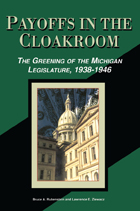
Payoffs in the Cloakroom is a spellbinding follow-up to Rubenstein and Ziewacz's critically acclaimed Three Bullets Sealed His Lips. Three Bullets brought to life new evidence on the 1945 murder of Michigan Senator Warren Hooper. Payoffs in the Cloakroom takes up where Three Bullets left off, unraveling a complex web of political corruption and dirty state politics. In the process, the authors demonstrate that Senator Hooper was murdered to prevent his grand jury testimony against republican boss Frank McKay, who was facing bribery charges.
Making use of actual court proceeding, personal interviews, and newspaper accounts, and even a re-evaluation of police evidence, Rubenstein and Ziewacz tell a story that contains all the ingredients of first-class detective fiction—only in this instance, the story is based on fact. With chapter titles such as "Charlie and His Little Black Book," "I Never Dreamed Murder," and "Them Bones, Them Bones," the authors have, once again, provided a stimulating and absorbing account of one of the darker chapters of Michigan's political history.

This intensively researched volume covers a previously neglected aspect of American history: the foreign policy perspective of the peace progressives, a bloc of dissenters in the U.S. Senate, between 1913 and 1935. The Peace Progressives and American Foreign Relations is the first full-length work to focus on these senators during the peak of their collective influence. Robert David Johnson shows that in formulating an anti-imperialist policy, the peace progressives advanced the left-wing alternative to the Wilsonian agenda.
The experience of World War I, and in particular Wilson’s postwar peace settlement, unified the group behind the idea that the United States should play an active world role as the champion of weaker states. Senators Asle Gronna of North Dakota, Robert La Follette and John Blaine of Wisconsin, and William Borah of Idaho, among others, argued that this anti-imperialist vision would reconcile American ideals not only with the country’s foreign policy obligations but also with American economic interests. In applying this ideology to both inter-American and European affairs, the peace progressives emerged as the most powerful opposition to the business-oriented internationalism of the decade’s Republican administrations, while formulating one of the most comprehensive critiques of American foreign policy ever to emerge from Congress.
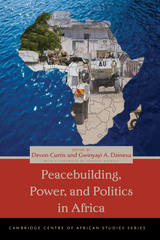
Peacebuilding, Power, and Politics in Africa is a critical reflection on peacebuilding efforts in Africa. The authors expose the tensions and contradictions in different clusters of peacebuilding activities, including peace negotiations; statebuilding; security sector governance; and disarmament, demobilization, and reintegration. Essays also address the institutional framework for peacebuilding in Africa and the ideological underpinnings of key institutions, including the African Union, NEPAD, the African Development Bank, the Pan-African Ministers Conference for Public and Civil Service, the UN Peacebuilding Commission, the World Bank, and the International Criminal Court. The volume includes on-the-ground case study chapters on Sudan, the Great Lakes Region of Africa, Sierra Leone and Liberia, the Niger Delta, Southern Africa, and Somalia, analyzing how peacebuilding operates in particular African contexts.
The authors adopt a variety of approaches, but they share a conviction that peacebuilding in Africa is not a script that is authored solely in Western capitals and in the corridors of the United Nations. Rather, the writers in this volume focus on the interaction between local and global ideas and practices in the reconstitution of authority and livelihoods after conflict. The book systematically showcases the tensions that occur within and between the many actors involved in the peacebuilding industry, as well as their intended beneficiaries. It looks at the multiple ways in which peacebuilding ideas and initiatives are reinforced, questioned, reappropriated, and redesigned by different African actors.
A joint project between the Centre for Conflict Resolution in Cape Town, South Africa, and the Centre of African Studies at the University of Cambridge.

The post-Cold War era has been difficult for Japan. A country once heralded for evolving a superior form of capitalism and seemingly ready to surpass the United States as the world’s largest economy lost its way in the early 1990s. The bursting of the bubble in 1991 ushered in a period of political and economic uncertainty that has lasted for over two decades. There were hopes that the triple catastrophe of March 11, 2011—a massive earthquake, tsunami, and accident at the Fukushima Daiichi nuclear power plant—would break Japan out of its torpor and spur the country to embrace change that would restart the growth and optimism of the go-go years. But several years later, Japan is still waiting for needed transformation, and Brad Glosserman concludes that the fact that even disaster has not spurred radical enough reform reveals something about Japan's political system and Japanese society. Glosserman explains why Japan has not and will not change, concluding that Japanese horizons are shrinking and that the Japanese public has given up the bold ambitions of previous generations and its current leadership. This is a critical insight into contemporary Japan and one that should shape our thinking about this vital country.
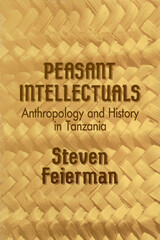
Scholars who study peasant society now realize that peasants are not passive, but quite capable of acting in their own interests. But, do coherent political ideas emerge within peasant society or do peasants act in a world where elites define political issues? Peasant Intellectuals is based on ethnographic research begun in 1966 and includes interviews with hundreds of people from all levels of Tanzanian society. Steven Feierman provides the history of the struggles to define the most basic issues of public political discourse in the Shambaa-speaking region of Tanzania. Feierman also shows that peasant society contains a rich body of alternative sources of political language from which future debates will be shaped.

“The modern European state has lived upon a reservoir of soldiers and electors provided by the peasantry, but the peasants have remained the object of politics and not its master,” states Suzanne Berger. One of the few political scientists and students of the modernization process to look at the peasant-state relationship in the old nations of Europe, Berger explores the impact of mass organization on the politics of the peasants.
“One might have predicted,” she writes, “that as peasants became involved in local cooperative and syndical associations, their participation in the politics of the national community would have increased.” The results of her research show, however, that between 1911 and 1967 peasant participation in a wide range of rural associations did not significantly contribute to their integration into the national political system. Why have changes in rural society had so little impact on the peasant's political role?
In considering this question, the author compares peasant organizations in Finistere and Côtes-du-Nord, two backward agricultural departments in western France. Although the social and economic structures of these areas were essentially the same, different types of organizations mobilized the peasants. In Finistere, corporative associations separated the countryside from the currents of national political life. As a result, party politics in Finistere became stagnant, and peasant electors voted in 1967 as they had in the first quarter of the century. In Côtes-du-Nord, on the other hand, the forces that organized the peasants were political parties, and they involved the countryside in national politics. It is this involvement that, according to the author, has contributed to a politicization of local communities and resulted in radical political change.
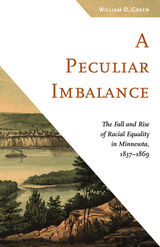
A Peculiar Imbalance is the little-known history of the black experience in Minnesota in the mid-1800s, a time of dramatic change in the region. William D. Green explains how, as white progressive politicians pushed for statehood, black men who had been integrated members of the community, owning businesses and maintaining good relationships with their neighbors, found themselves denied the right to vote or to run for office in those same communities.
As Minnesota was transformed from a wilderness territory to a state, the concepts of race and ethnicity and the distinctions among them made by Anglo-Americans grew more rigid and arbitrary. A black man might enjoy economic success and a middle-class lifestyle but was not considered a citizen under the law. In contrast, an Irish Catholic man was able to vote—as could a mixed-blood Indian—but might find himself struggling to build a business because of the ethnic and religious prejudices of the Anglo-American community. A Peculiar Imbalance examines these disparities, reflecting on the political, social, and legal experiences of black men from 1837 to 1869, the year of black suffrage.
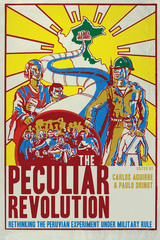
On October 3, 1968, a military junta led by General Juan Velasco Alvarado took over the government of Peru. In striking contrast to the right-wing, pro–United States/anti-Communist military dictatorships of that era, however, Velasco’s “Revolutionary Government of the Armed Forces” set in motion a left-leaning nationalist project aimed at radically transforming Peruvian society by eliminating social injustice, breaking the cycle of foreign domination, redistributing land and wealth, and placing the destiny of Peruvians into their own hands. Although short-lived, the Velasco regime did indeed have a transformative effect on Peru, the meaning and legacy of which are still subjects of intense debate.
The Peculiar Revolution revisits this fascinating and idiosyncratic period of Latin American history. The book is organized into three sections that examine the era’s cultural politics, including not just developments directed by the Velasco regime but also those that it engendered but did not necessarily control; its specific policies and key institutions; and the local and regional dimensions of the social reforms it promoted. In a series of innovative chapters written by both prominent and rising historians, this volume illuminates the cultural dimensions of the revolutionary project and its legacies, the impact of structural reforms at the local level (including previously understudied areas of the country such as Piura, Chimbote, and the Amazonia), and the effects of state policies on ordinary citizens and labor and peasant organizations.
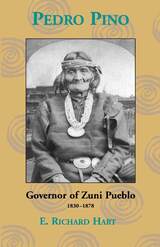
Pedro Pino, or Lai-iu-ah-tsai-lu (his Zuni name) was for many years the most important Zuni political leader. He served during a period of tremendous change and challenges for his people. Born in 1788, captured by Navajos in his teens, he was sold into a New Mexican household, where he obtained his Spanish name. When he returned to Zuni, he spoke three languages and brought with him a wealth of knowledge regarding the world outside the pueblo. For decades he ably conducted Zuni foreign relations, defending the pueblo's sovereignty and lands, establishing trade relationships, interacting with foreigners-from prominent military and scientific expeditions to common emigrants-and documenting all in a remarkable archive. Steeped in Zuni traditions, he was known among other things for his diplomatic savvy, as a great warrior, for his oratory, and for his honesty and hospitality.
More than a biography, Richard Hart's work provides a history of Zuni during an especially significant period. Also the author of Zuni and the Courts: A Struggle for Sovereign
Land Rights and the co-author of A Zuni Atlas, Hart originally wrote the manuscript in 1979 after a decade of historical work for Zuni Pueblo. He then set it aside but continued to pursue research about and for Zuni. Its publication, at last, inscribes an important contribution to Pueblo history and biography and a testimonial to a remarkable Native American leader. In an afterword written for this publication, Hart discusses his original intentions in writing about Pedro Pino and Zuni and situates the biography in relation to current scholarship.
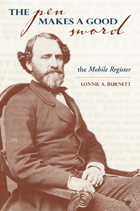
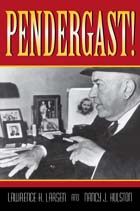
Born in St. Joseph, Missouri, in 1872, Tom Pendergast moved to Kansas City around 1890 to work for his brother James, founder of the Pendergast "Goat" faction in Kansas City Democratic politics. In 1911, Pendergast became head of the Goats, and over the next fifteen years he created a powerful political machine that used illegal voting and criminal enforcers to gain power. Following a change in the city charter in 1925, Pendergast took control of Kansas City and ran it as his own personal business. In the 1930s, he received over $30 million annually from gambling, prostitution, and narcotics, putting him in the big leagues of American civic corruption. He also wielded great power in the National Democratic Party and started Harry S. Truman on the road to the presidency.
In this well-balanced biography, the authors examine Pendergast's rise to power, his successes as a political leader, his compassion for the destitute, and his reputation for keeping his word. They also examine Pendergast's character development and how his methods became more and more ruthless. Pendergast had no use for ideology in his "invisible government"—only votes counted.
In 1937 and 1938 the federal government broke the back of Pendergast's machine, convicting 259 of his campaign aides for vote fraud. In 1939 Pendergast, who was believed to be the largest bettor on horse racing in the United States, was jailed for income tax evasion, and he died in disgrace in 1945.
An insightful and comprehensive biography, Pendergast! will surely serve for years to come as the most thorough investigation of the life and infamous career of Tom Pendergast.

These partial changes destroyed the Pare’s balanced subsistence structure. But throughout the colonial period they were frustrated in their efforts to transform themselves fully into capitalist producers. These struggles finally led to open revolt in 1947 and it was three years before the protest ended. Between 1947 and 1960 the colonial government tried to reverse the effects of the revolt without providing the kind of transformation desired by the peasants.
This study illustrates vividly the difference between the intentions of capital and those of the colonized peasantry. The intentions of the two sides seemed to be incompatible. While imperialism would allow for the limited participation that would maximize profits for metropolitan capital, the peasants were struggling for freedom to transform themselves into capitalist producers.
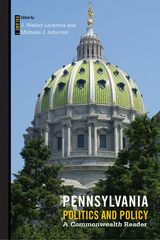
The activities of state governments have always been important in the American federal system. However, recent partisan gridlock in Washington, DC has placed states at the forefront of policymaking as the national government maintains the status quo. Pennsylvania Politics and Policy, Volume 1 is designed to showcase current issues of interest to Pennsylvanians. This reader contains updated chapters from recent issues of Commonwealth: A Journal of Pennsylvania Politics and Policy on education, health care, public finance, tax policy, environmental policy, alcohol policy and more. Each chapter is supplemented by forums with arguments in support of or opposed to contested elements of state policy, discussion questions, and suggestions for further reading.
In addition, Pennsylvania Politics and Policy, Volume 1 includes a comprehensive guide to researching state government and policy online. It is designed as a text or supplement for college or advanced high school classes in American government, state and local politics, public policy, and public administration.
Contributors include: David G. Argall, Tom Baldino, Michele Deegan, Michael Dimino, George Hale, Rachel L. Hampton , Paula Duda Holoviak Jon Hopcraft, Vera Krekanova, Maureen W. McClure, Barry G. Rabe, Marguerite Roza, Lanethea Mathews Shultz, Jennie Sweet-Cushman, Amanda Warco, and the editors.
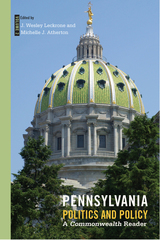
Designed to showcase current issues of interest, Pennsylvania Politics and Policy, Volume 2 isthe second reader consisting of updated chapters from recent issues of Commonwealth: A Journal of Pennsylvania Politics and Policy. The editors and contributors to this volume focus on government institutions, election laws, the judiciary, government finance and budgeting, the opioid crisis, childcare, property taxes, environmental policy, demographics, and more. Each chapter is supplemented by discussion questions, suggestions for further reading, and forums with arguments in support of or opposed to contested elements of state policy.
In addition, Pennsylvania Politics and Policy, Volume 2 includes a detailed guide to researching state government and policy online, as well as a comprehensive chapter on the structure of Pennsylvania government. It is designed as a text or supplement for college or advanced high school classes in American government, state and local politics, public policy, and public administration.
Contributors include: John Arway, Jenna Becker Kane, Jeffrey Carroll, Bob Dick, Ashley Harden, Stefanie I. Kasparek, Vera Krekanova, Maureen W. McClure, John F. McDonald, Josh Shapiro, Marc Stier, Jennie Sweet-Cushman, James Vike, and the editors.
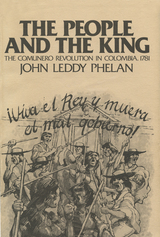
In The People and the King, John Leddy Phelan reexamines a well-known but long misunderstood event in eighteenth-century Colombia. When the Spanish colonial bureaucratic system of conciliation broke down, indigenous groups resorted to armed revolt to achieve their political ends.
As Phelan demonstrates in these pages, the crisis of 1781 represented a constitutional clash between imperial centralization and colonial decentralization. Phelan argues that the Comunero revolution was not, as it has often been portrayed, a precursor of political independence, nor was it a frustrated social upheaval. The Comunero leaders and their followers did not advocate any basic reordering of society, Phelan concludes, but rather made an appeal for revolutionary reform within a traditionalist framework.
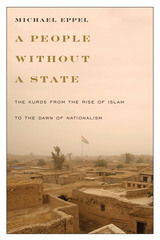
Numbering between 25 and 35 million worldwide, the Kurds are among the largest culturally and ethnically distinct people to remain stateless. A People Without a State offers an in-depth survey of an identity that has often been ignored in mainstream historiographies of the Middle East and brings to life the historical, social, and political developments in Kurdistani society over the past millennium.
Michael Eppel begins with the myths and realities of the origins of the Kurds, describes the effect upon them of medieval Muslim states under Arab, Persian, and Turkish dominance, and recounts the emergence of tribal-feudal dynasties. He explores in detail the subsequent rise of Kurdish emirates, as well as this people’s literary and linguistic developments, particularly the flourishing of poetry. The turning tides of the nineteenth century, including Ottoman reforms and fluctuating Russian influence after the Crimean War, set in motion an early Kurdish nationalism that further expressed a distinct cultural identity. Stateless, but rooted in the region, the Kurds never achieved independence because of geopolitical conditions, tribal rivalries, and obstacles on the way to modernization. A People Without a State captures the developments that nonetheless forged a vast sociopolitical system.
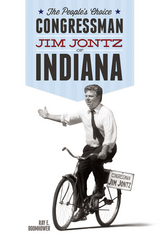

Few institutions are as well suited as the monarchy to provide a window on postwar Japan. The monarchy, which is also a family, has been significant both as a political and as a cultural institution.
This comprehensive study analyzes numerous issues, including the role of individual emperors in shaping the institution, the manner in which the emperor’s constitutional position as symbol has been interpreted, the emperor’s intersection with politics through ministerial briefings, memories of Hirohito’s wartime role, nationalistic movements in support of Foundation Day and the reign-name system, and the remaking of the once sacrosanct throne into a “monarchy of the masses” embedded in the postwar culture of democracy. The author stresses the monarchy’s “postwarness,” rather than its traditionality.
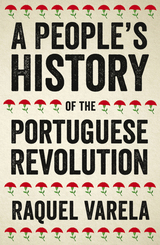
This became the Carnation Revolution - an international coalition of working class and social movements, which also incited struggles for independence in Portugal’s African colonies, the rebellion of the young military captains in the national armed forces and the uprising of Portugal’s long-oppressed working classes. It was through the organising power of these diverse movements that a popular-front government was instituted and Portugal withdrew from its overseas colonies.
Cutting against the grain of mainstream accounts, Raquel Cardeira Varela explores the role of trade unions, artists and women in the revolution, providing a rich account of the challenges faced and the victories gained through revolutionary means.
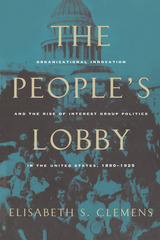
Clemens sheds new light on how farmers, workers, and women invented strategies to circumvent the parties. Voters learned to monitor legislative processes, to hold their representatives accountable at the polls, and to institutionalize their ongoing participation in shaping policy. Closely analyzing the organizational politics in three states—California, Washington, and Wisconsin—she demonstrates how the political opportunity structure of federalism allowed regional innovations to exert leverage on national political institutions.
An authoritative statement on the changes in American politics during the Progressive Era, this book will interest political scientists, sociologists, and American historians.
READERS
Browse our collection.
PUBLISHERS
See BiblioVault's publisher services.
STUDENT SERVICES
Files for college accessibility offices.
UChicago Accessibility Resources
home | accessibility | search | about | contact us
BiblioVault ® 2001 - 2024
The University of Chicago Press









